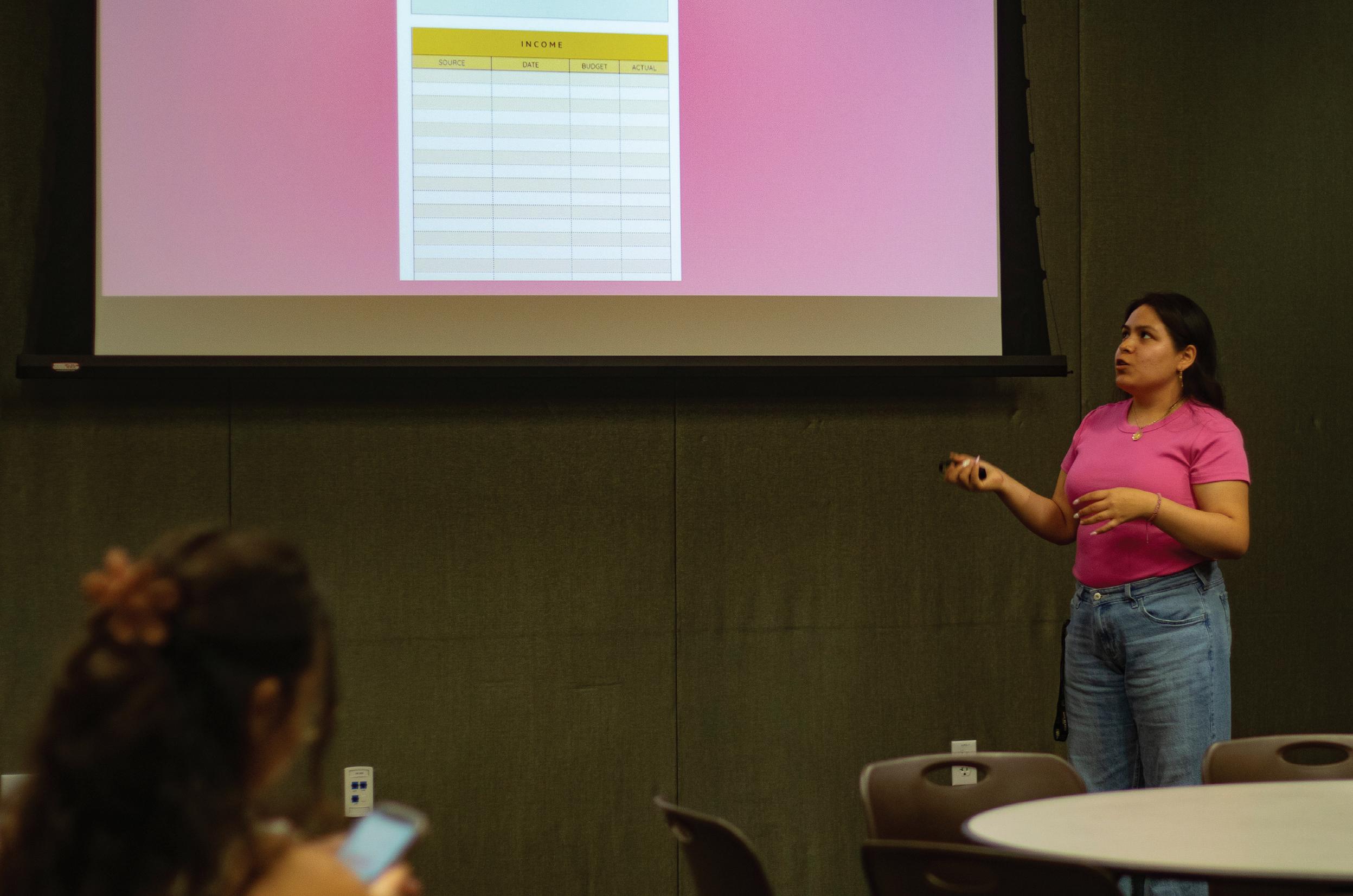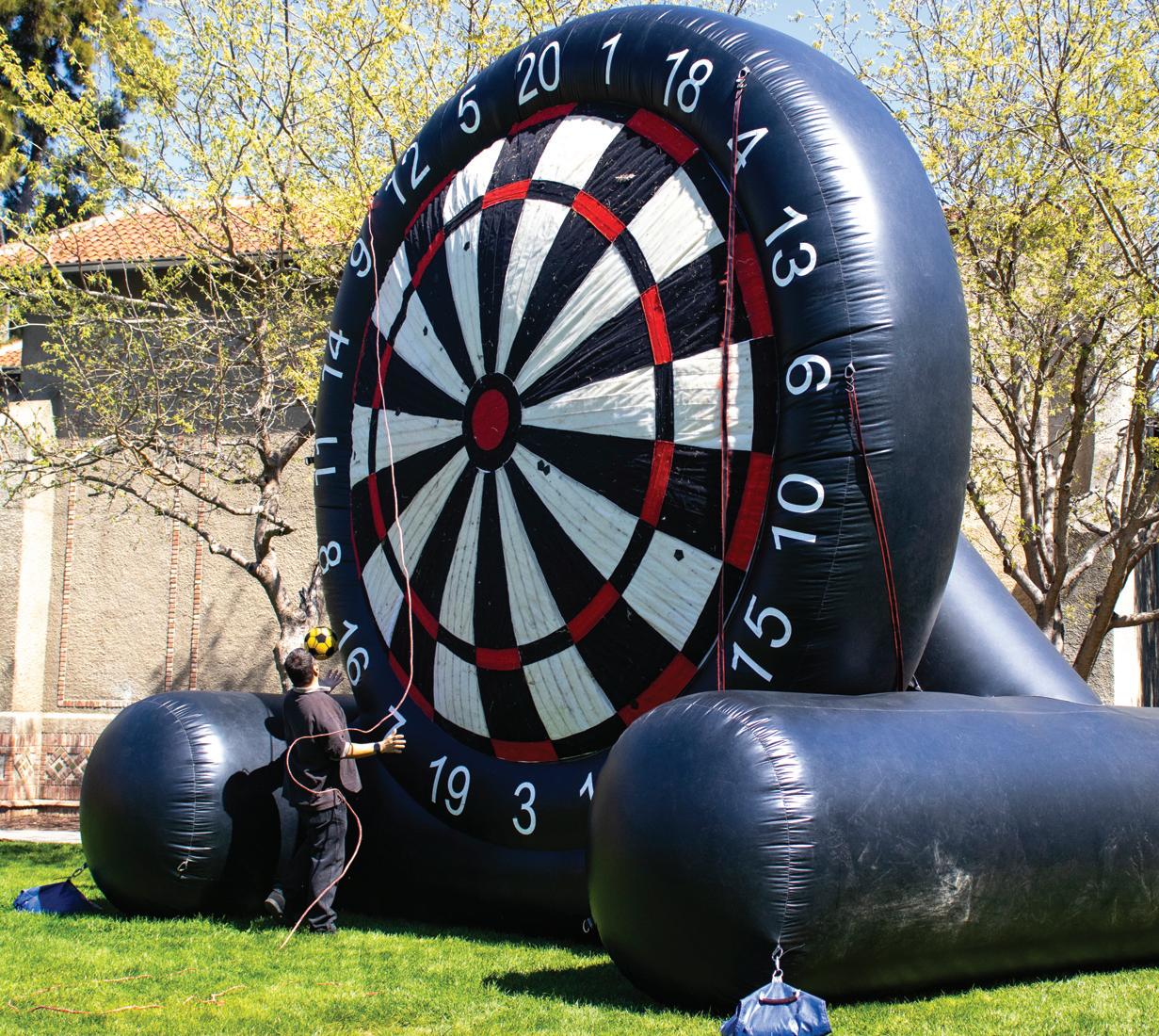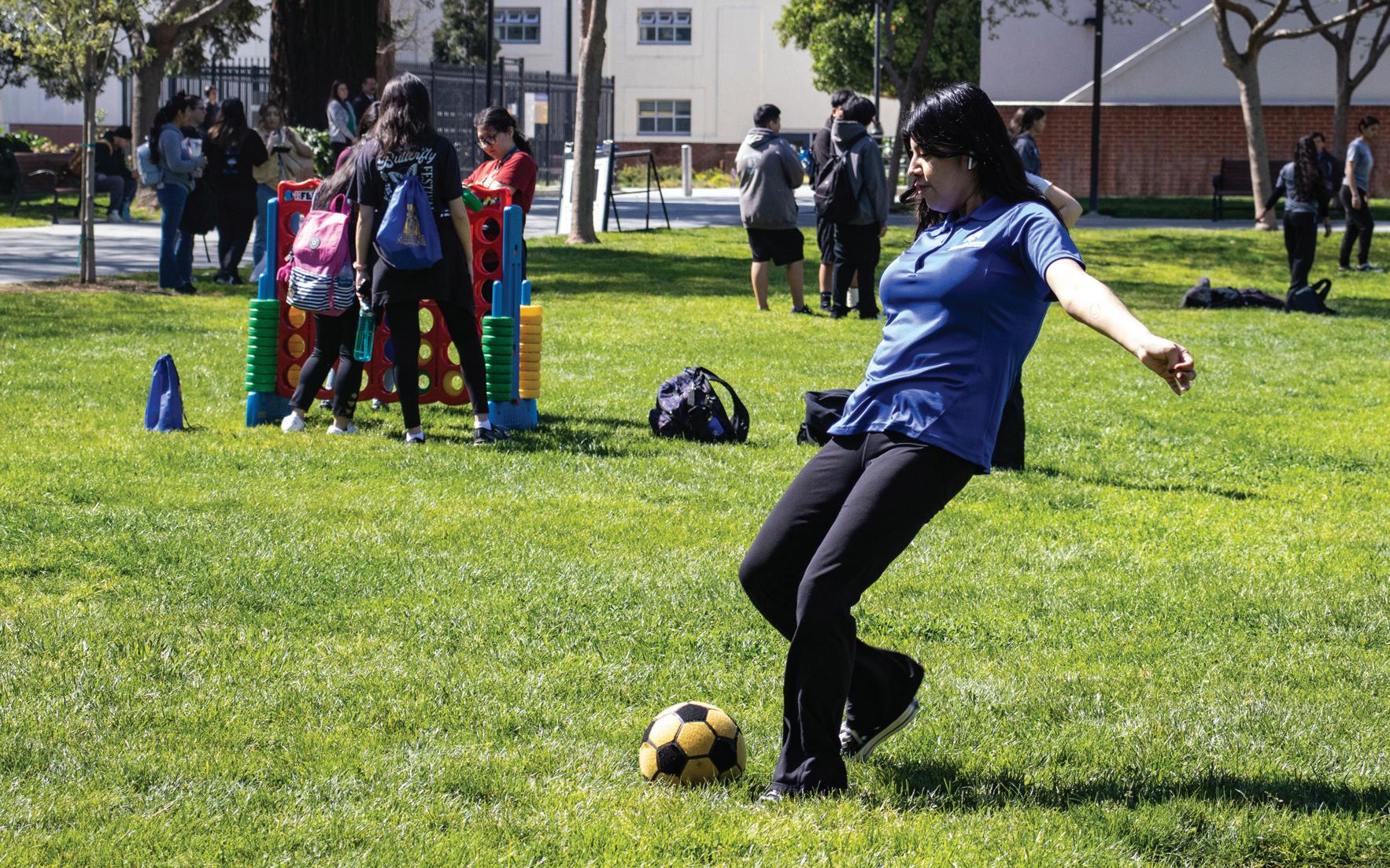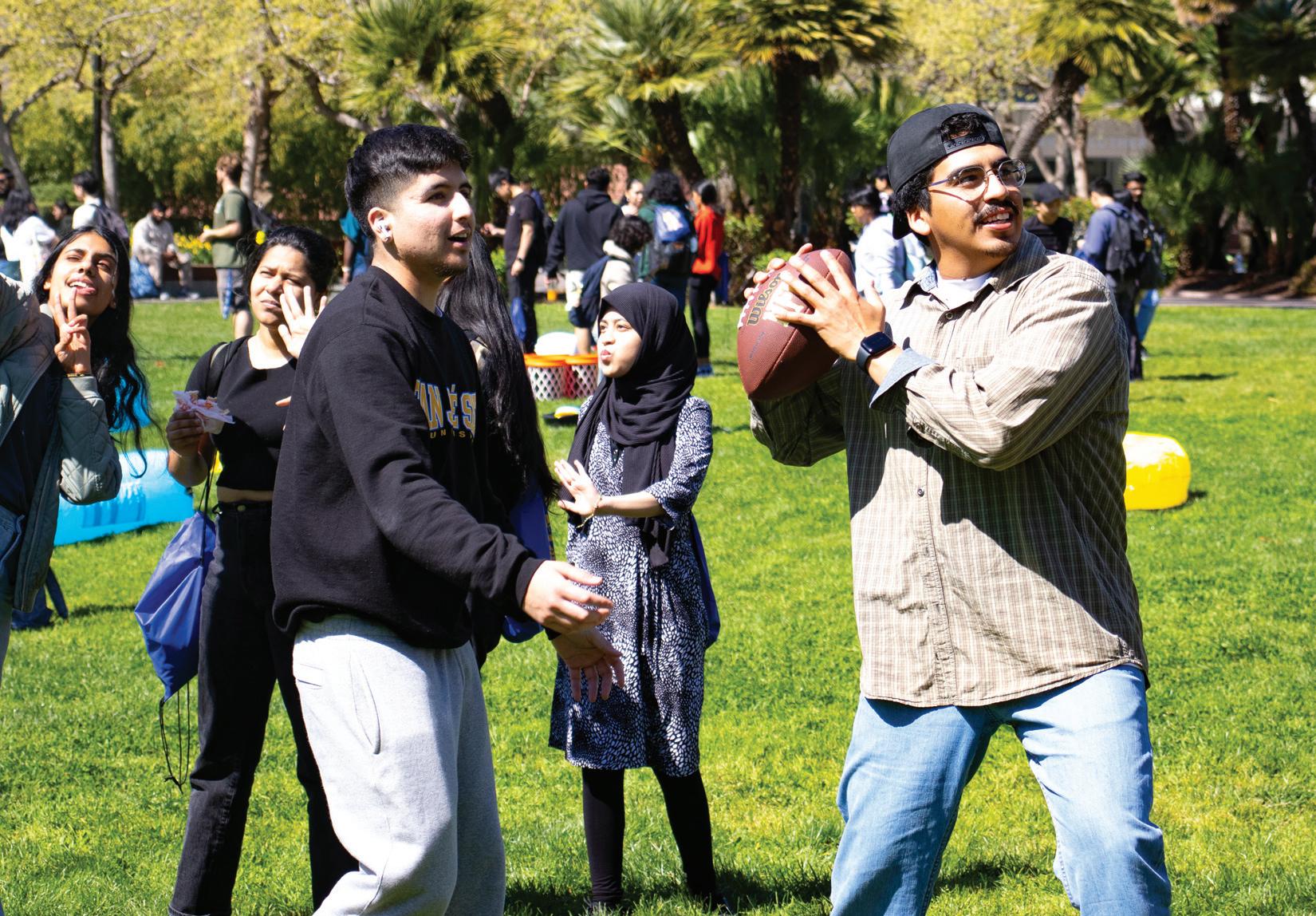






In Student Union Meeting Room 3A, the smell of rosemary and the sounds of chatter filled the room as a student club MEChA de San José hosted a guest speaker session Tuesday evening.
The student organization MEChA’s name stands for Movimiento Estudiantil Chicanx de Aztlán which translates to Chicano Student Movement of Aztlán.
Sofia Calderon, MEChA co-chair and political science freshman said the organization is a Latino social justice group that focuses on building a community for Latinos.
“I am a firm believer that we can build community through activism,” Calderon said. “I want to help uphold the Chicano movement and the values they instilled in this movement.”
MEChA has 500 chapters across United States college campuses and was founded in 1969, according to a webpage from the University of Washington.
As attendees waited for speaker María Ramos Bracamontes they were asked to get into groups and answer introduction questions led by Yasmine Ortiz, co-chair and political science sophomore.
Ortiz asked students three questions each so individuals can get to know each other and meet new people.
As the organization prepared for Ramos Bracamontes, biology junior Nataly Manzanero and Calderon prepared an altar featuring famous
Latina women. Photographs were placed on top of a woven fabric with lace that was surrounded by cinnamon sticks, rosemary, and flowers.
“Connecting in this sense to our ancestral roots, I think is really grounding and almost tear-jerking in some way,” said Calderon.
Ramos Bracamontes helped establish Campesina Womb Justice, a mutual aid project for womb justice and healing indigenous farmers, according to its Instagram page.
Ramos Bracamontes said the project began during the pandemic while she was pregnant and working as a midwife serving undocumented indigenous women from the Highlands of Oaxaca.
“My work has been through being a midwife and attending the sacred ceremony of birth and

Indigenous practice of purifying or cleansing the soul of negative thoughts of a person or place, according to a webpage for the Indigenous Corporate Training Inc.
Ancestry is a gift that is abundant, that is richness and that is going to help us heal.
María Ramos Bracamontes Co-founder of Campesina Womb Justice
protecting that journey,” Ramos Bracamontes said. “But also (through) new families and providing Mexican traditional healing.”
Before beginning to speak, she had the group meditate while she walked around smudging the room with essential oils.
Smudging is an
While individuals mediated they deeply inhaled the fresh rosemary Ramos Bracamontes handed out.
Rosemary not only has health benefits including combating fatigue and depression, it also is used in spiritual cleansing practices, according to the website for UIC Heritage
Garden.
“You can use (rosemary) for stings, like nasal stings or your congestion,” Ramos Bracamontes said.
Ramos Bracamontes was invited to speak to MEChA as a way to honor Women's History Month.
“I think that gender is more spiritual than physical, so we want to include everybody,” said Ramos Bracamontes.
Calderon followed the Campesina Womb Justice movement since high school and felt it was fitting to invite Ramos Bracamontes to talk about women, indigeneity, the Latina community and the significance of being connected to one’s ancestral roots.
Ramos Bracamontes said she aims to teach and is looking for funding to train female farm workers to use Mexican traditional healing practices such as sobada to work as community healers.
Sobadas is a traditional
Mexican massage that is used to treat digestive issues, musculoskeletal pain and infertility to manage trauma both in the mind and body according to a 2020 article from South Side Weekly. “I am teaching this so campesinas don’t have to break their back in the fields, be harassed, and polluted in the fields,” Ramos Bracamontes said.
In California alone 80% of women farmworkers have experienced some form of sexual harassment, according to the Center for Farmworker Families website. Ramos Bracamontes said she was born in Cocula, Jalisco which has a small community of indigenous people.
As of 2020 the Cocula Territory has a population of 16,550, according to a map from the City Population website.
Along with Ramos Bracamontes attendees shared their own ancestral
heritage, with many sharing a similar background.
“Ancestry is a gift that is abundant, that is richness and that is going to help us heal,” Ramos Bracamontes said.
She said using traditions including utilizing natural remedies allows individuals to connect more with their ancestry.
Calderon said she experienced goose bumps throughout the speaking event because Ramos Bracamontes was from the same hometown as her mother.
“The way she just elaborated on holistic healing as well as going back to natural remedies which is in and of itself a way to honor our heritage,” Calderon said. “I thought it was beautiful, intimate, sacred and fulfilling.”
The Chicanx/Latinx Student Success Center, also known as Centro, hosted a discussion workshop on Tuesday evening about creating financial stability through budgeting with a goal to foster connections and conversations between San José State students who are financially struggling.
Centro is a safe and empowering learning space for Latinx students on campus where they can connect, collaborate or
study with other students, according to its website. Centro strives for community outreach and advocacy in many ways: One being through their student employees called student success leaders who offer personal advice and academic support through workshops, seminars and other events, according to the same website.
Centro Student Success Leader and Chicanx studies senior, Carolina Medina said she felt inspired to create and host the workshop, which she named “Girl
Math,” because of the financial struggles she’s encountering herself as a college student.
like she has people she can rely on financially.
“Most of my tuition gets paid for by grants,”
like) books, being able to go out with your friends (and) buying things that you need in life to survive whether that's groceries, new clothes, a new laptop because the old one broke — whatever it is.”
something she wanted to openly discuss with people who are facing similar issues as her — to remove the stigma around having financial issues.
I think that sometimes we’re ashamed to say that we’re broke, but in reality, it’s the truth.
Carolina Medina Centro Student Success Leader and Chicanx studies senior
She said as a firstgeneration college student, she does not feel
Medina said. “On top of that I have, as with any student comes (expenses
Medina said she started feeling the need to enforce financial planning and literacy into her life when she noticed that her paychecks would not last long, which led to worse financial situations such as having to rely on credit cards.
She said she often had to watch her bank accounts go negative which was
“I think that sometimes we're ashamed to say that we're broke, but in reality, it's the truth,” Medina said.
Aerospace engineering junior Katy Reyes said she feels uncomfortable talking to anyone about money, which is what attracted her to the workshop.
She said the discussion
GIRL MATH | Page 2
Continued from page 1
about finances is exactly what she needed to tackle her financial stress as a student who also has a part-time job.
“I try to schedule my time out to make sure that I am able to work more (during the) week to make sure that everything that needs to be paid for can get paid for,” Reyes said.
She said she likes to always be assured that all her necessities are paid for even though it can be stressful to balance her finances and school.
Medina said she wanted to use the workshop as a way to bring awareness to the serious effects firstgeneration students face when it comes to financial stress.
She said one of the most serious and negative effects of financial stress is the decline in a student's academic performance.
Medina said firstgeneration students are more likely to neglect academic work due to financial stress, according to a 2023 study she found by Ohio State University.
“38% of the students that they interviewed (in the study) were more likely to neglect academic work due to financial strain and that leads to getting put on academic probation, that leads to lower GPAs, maybe having to retake a class, maybe delaying your graduation by a semester or by a year and when you delay your graduation you’re once again left paying all of this tuition money,” Medina said.

Anahí Zamudio Santiago, a child and adolescent development freshman who is currently working two jobs, said when she started her second job she saw a decline in her academic performance because she felt like she had to neglect school work to maintain the job.
“I like missed assignments that I had to do because I had to go to work,” Santiago said. “Especially when they (the boss) would call me last minute, I had trouble saying, ‘No, I can’t go in,’ so I’d end up not doing my homework because I had
to go to work.”
Zamudio Santiago said after recently moving out of her parents house and being on her own, she wants to learn how to handle her money so she can save up and have it for longer periods of time after she gets paid.
Centro outreach and workshop specialist Yesenia Guzman said learning about financial literacy is essential to sustain yourself in college when living independently for the first time.
She said even though financial stress can have many negative impacts on a student’s academic
performance and social life, there are ways they can learn financial literacy and start practicing good financial habits including budgeting.
“You want to enjoy the process of managing your money (and) you can choose where to allocate your money so you can be saving and at the same time have the money to buy yourself a nice coffee or buy yourself a meal or go out with friends,” Guzman said. Guzman said financial planning, like budgeting, is about making informed choices based on the financial resources you
have available. Medina wanted to use her workshop to also introduce the format of a budgeting document, and how finances can be broken down into sections of expenses to make spending reports look clear and less scary to deal with.
“I feel like the budget form was really helpful, I feel like it really broke down everything,” Zamudio Santiago said. “I was able to see how much money I’m really spending every month like altogether instead of just seeing it in my bank account.”
Medina said as college students deal with high expenses, it’s inevitable that a student will work a full-time job, two parttime jobs or even two full-time jobs to be able to afford basic necessities, but she does not believe this means a college student should not treat themselves from time to time.
“We don’t just want to survive, we want to thrive in whatever environment that may be, college or otherwise,” Medina said.

3



5


#1: A black, red and cream-colored inflatable dart board sits at the edge of Tower Lawn as students attempt to score a target by kicking soccer balls.
#2: Isabel Osorio, child and adolescent development sophomore, kicks a soccer ball at the large inflatable target.
#3: Civil engineering seniors, Marco Solis and Kaleb Guttirez, throw footballs into an inflatable stand to score points.
#4: Business management freshman Rianna Robert Kennedy attempts to hula-hoop using three rings, dropping one in the process.
#5: A student kicks a blue soccer ball and tries to score a goal as his friends watch him closely.
#6: Students are encouragred to throw footballs, soccer balls and baseballs towards red, blue and yellow inflated stands next to an oversized dart board.

As the 2023-24 AllMountain West Media Honorable Mention, junior guard Myron ‘MJ’ Amey Jr. remains a humble, driven and hardworking player despite a season full of adversity on the San José State basketball team.
Amey, who is majoring in communications, said his dad put him in many sports when he was younger including baseball, football and basketball.
He said his dad was a baseball player and wanted him to pursue the sport further, but ultimately did not care which sport Amey ended up playing in the future.
“I just had a different love and a different passion about basketball,” Amey said. “I always had a hoop outside of my driveway as a kid, so whenever I had free time I would go outside and play with my brothers or friends.”
Amey attended Vacaville High School for four years, averaging 27 points, 5 assists, 4.5 rebounds and 1.6 steals, according to the SJSU Athletics page. After graduating, he attended Scotland Prep in Pennsylvania, averaging 20.3 points in 3 games with a single-game best of 26 points, according to the same site. He was offered a scholarship to SJSU

by assistant coach Ben Johnson, and now averages 15.7 points per game. “The thing about college basketball is that everyone is good,” Amey said. “Everyone has their own special ability that lets them play at this level, so my work ethic is something I rely on in order to get better.”
In the 2021-22 season, Amey averaged 9.4 points per game, along with 73 rebounds and 18 steals, according to the SJSU Athletics page. During the 2022-23 season, he averaged 5.6 points and played in nine games before an ankle injury robbed him of the rest of the season.
Amey said while it was a difficult time, he believed
that the injury was simply a part of the plan God had for him and his future.
“I had to really explore myself outside of basketball,” Amey said. “I realized that one day, the ball is going to stop bouncing. So, it was good for me to explore and find myself outside of the sport at an early age.”
Amey also said he was able to spend time bowling, skating, going to the beach and taking himself to get food in order to cope with the situation.
Freshman guard Latrell Davis said he remembers Amey telling him that because Amey had been injured for so long, the 2023 season felt like freshman year for him again.
“When I first came here, he really inspired me,” Davis said. “His words always encourage me, and they really hit because I can relate to them. He really brings the energy and work ethic to this team.”
Davis said aside from being a hard-working player, Amey is a funny guy, and lightens up the mood every time he walks into a room.
“He’ll be in the weight room and will just start dancing, and they’ll be crazy dance moves, but only he can make them look good,” he said.
Davis also said basketball is more than just a sport to him. It’s also all about building connections
and chemistry with his teammates.
He said it is about changing people’s lives at the same time.
“I would go to war with these people,” Davis said.
Junior guard Alvaro Cardenas said Amey is an amazing scorer, and that he is the guy who is always going to play as hard as he can. Cardenas also said it is hard to stop him once he gets going. “Against Boise he had 25 in the first half,” Cardenas said. “Once he sees the rim, it’s really hard to stop him.”
Despite the Spartans 78-69 loss against Boise State on Jan. 5, Amey continued to score even
after his 25 points in the first half, according to 247 Sports. He ended up with a season high of 30 points overall, according to the same site.
Cardenas said Amey is someone he enjoys being around, as he is always joking and playing around off the court.
“He’s honestly the nicest guy to be around,” he said. “There’s really nothing bad to say about him.”
Alongside Amey were six other All-Mountain West Honorable Mentions, including Chibuzo Agbo and Max Rice from Boise State, Lamont Butler from San Diego State, Kalib Boone from University of Nevada, Las Vegas, Ian Martinez from Utah State and Sam Griffin from University of Wyoming, according to the Mountain West Conference website.
After being awarded the All-Mountain West Honorable Mention, Amey said it made him realize how far he had come after his injury and having to go through surgery.
“If someone had told me that a year after my surgery I would be getting this award, I would have said they were crazy,” Amey said. “I am extremely blessed to have been given this honor.”
